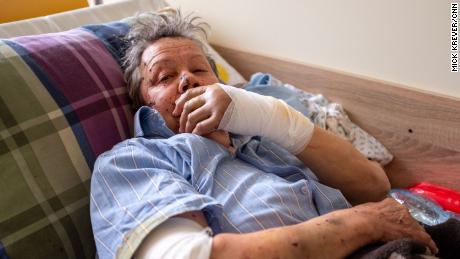In Ukraine’s Russian-speaking east, Putin’s war is tearing families apart

It was in her elderly mother’s wood-frame summer kitchen that Ludmilla, 69, was chatting to her brother Victor, 72, who went by Vitya, in the Ludmilla was momentarily blinded. Blood poured from her face and from lacerations on her hands and feet, but she was alive. She felt the touch of a neighbor, who pulled her to safety, to her basement. Her 96-year-old mother, mercifully, was unscathed.”I ask, ‘How’s my brother, how’s Vitya?’ And the neighbor hides his eyes and says: ‘Everything is fine.'”I said to him, ‘Vova, I don’t believe it. If it were okay, he would have come seen us.'”He says, ‘Everything is OK down, sit down,’ and goes out. And his wife is sitting next to me and says ‘Luda, he doesn’t know how to tell you. Vitya is dead.'”That’s it. And my brother would be 73-years-old on May 6. And that was it.””In two months, they have realized that they cannot break through the defense. So they are trying to bypass or cut off from the direction of Popasna and Rubizhne. And then the Luhansk region will be encircled. And then they won’t need to lose the soldiers, they will just shoot all the areas.”This tactic is playing out not just on the eastern edge of what remains of the Ukrainian-controlled Luhansk region. It is also true in the south, along the line of contact that has existed since the 2014-15 breakaway rump states formed; and in the north, as Russia pushes south from Izium and west towards Lyman.If successful, it would trap a devastating portion of the Ukrainian military. The main population centers of Sloviansk and Kramatorsk — so far largely unharmed from enemy artillery — would find themselves behind enemy lines.Every day, backhoes carve more defensive trenches into the fertile fields, and trucks stack concrete and earthen chicanes onto the highways. A major railroad bridge between Sloviansk and Lyman was destroyed last week; whether by Russian strike or Ukrainian sabotage is still unclear.Hayday is convinced that the Ukrainian military can hold the Russians off for another two or three weeks. The small, agile anti-air and tank weapons given by Western powers are helping, he said. But it is only once the promised heavy artillery actually reaches the frontline that the tide can be turned.”That, unfortunately, is not here yet,” he said. “And it could completely change the whole war.”Ludmilla now spends her days with her mother and a stranger in a small hospital room more than hour to the west, in Bakhmut. Her face is pockmarked with wounds from the debris that was blasted into her face.Most of her neighbors left for safer lands long ago. But many others have remained — because they don’t have the means to leave, because they want to protect their homes, or because they’re in denial that this war will be any different than the long-simmering battles that have raged in this region since 2014.”As long as greed and avarice in humanity are not overcome, these wars will never end,” Ludmilla said. “No matter how much a person has, it is always not enough.”







